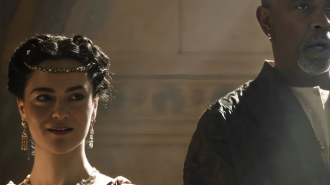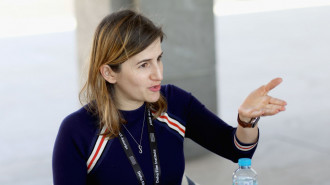Under the Mulberry Tree: Young Uyghur exiles evoke memory through poetry
"Do you remember the smell of your grandmother's home,
And the gentle whispers of your grandfather's prayers?
Do you remember the love that rooted itself in you, there?
Do you remember the reason you pour kindness into the world?
Do you remember that you are your grandmother's home?"
Twenty-something Aykezar Adil who wrote these lines can barely remember the Uyghur homeland or her grandmother's face.
Now living in the USA, she fled when she was five with her parents who were escaping Chinese government persecution, and in common with most of her compatriots, all links with their families have now been severed amid the turmoil and clampdowns of recent years.
Few can or would dare return to the land they fear has been lost to them forever.
|
But an unquenchable fire for their land still burns within them; a yearning for a world that has gone but has somehow embedded itself deep in their soul.
How to satisfy that ethereal longing and to keep those memories alive has been the raisin d’être of Under the Mulberry Tree, an anthology of art and verse, prose and muse by young Uyghur exiles to give vent not only to their melancholy but to a determination to savour the unique creativity and rich culture of their people.
As a collaboration between the Tarim Network, the Jewish human rights group, René Cassin, and Moishe House, the collection is a creative reflection of the beauty and complexities of the Uyghur experience as lived by those scattered to the four winds because of persecution in their homeland.
As culture, language, and literature is being dismantled in East Turkestan, their hope is to stir up a living memory at this pivotal moment of Uyghur history.
Launching the collection, Sonya Imin, Maidina Kadeer and Munawwar Abdulla, all exiled from their homeland, hate the idea that their people would be remembered only as "victims of genocide."
Uyghur culture, full of art, joy, spontaneity and humour is so much more than that, they say. The anthology, the first volume of many to come they trust, is an exuberant "protest through joy" and a celebration of all that the authors love about their nation.
Quoting Holocaust survivor Elie Wiesel, "Without memory, there is no culture. Without memory there would be no civilisation, no society, no future," Kadeer stresses the importance of the second generation as memory carriers but admits that for some, those fleeting echoes are blurring by the day.
|
Camilla Dilshat, born and raised in London and now studying for a Masters in fine arts, only visited Xinjiang twice as a child. Haunted by the threat that she might never see her homeland again she is intrigued by the ideas of remembering and misremembering, of belonging, and at the same time, not belonging.
As part of the diaspora growing up where food rituals and communal feasting formed the bedrock of life together, she nevertheless struggles to cling to cultural identity, heritage and ancestry, largely rooted in the homeland.
As the sepia images recede to the back of her mind, she tries to summon the searing desert plains of her mother's home town, through an installation of twigs and sand and simple artefacts.
"I wanted to extend the life of my fading memories," she says. The branches representing hand-made wood-framed and mud-walled homes, intertwined with hair braids, salt dough snakes, raw clay bones and stretched latex noodles wound around ceramic tongues, give form to her reminiscences.
The texture of the sand between her fingers, the ritual and repetitive act of rolling out the dough for the Uyghur "Laghman" staple, an acquired art yet to be learned by most diaspora youth but perfectly mastered by their ancestors, and the manual braiding of hair, revive buried mental images and rekindle her feelings of loss.
Sand between his toes is also an enduring reminder for Kabir Qurban. Struggling as he grew up with Dari-speaking Uyghur parents who had fled to Afghanistan from East Turkestan in their youth, for much of his life he imagined he was Afghan.
One of his grandfathers traded almonds and the other worked gold, but this provided few clues as to who he was more than a century later. He was born in Kazakhstan, grew up speaking Russian, and for some time wondering whether it was his Russian language that defined him.
A crisis of cultural identity came to a head after a further family move to Canada where no one had heard of the "Uyghurstan" he would proudly proclaim citizenship of. "What's this 'yoghurtstan' you are talking about?" they would mock.
He has found that many westerners have trouble putting their finger on Uyghur distinctiveness and he had difficulty adjusting to the pigeonholes assigned to him by well-meaning people.
Reclaiming not only his nationhood but also his unique individuality has been an ongoing process. Having only visited Xinjiang four times in his life, he too struggles to remember. His embroidered Uyghur "doppa" skull cap might start a conversation about "Uyghurness", but he is reluctant to immediately launch into a treatise on genocide.
"We were not always victims," he says. "We are scholars, poets, musicians, aristocrats, tradesmen, engineers, doctors, lawyers, pharmacists, and we are proud. Our culture is rich, almost 4000 years old." "We are so much more than victims," he stresses. "We have the power to reclaim our narrative, and we should for the sake of future generations. We must pave the way for the next generation to walk on."
Sarah Suzuk's black and white pencil cartoon images are an aide memoir of the land she left at nine.
"If I try really hard I can go back,
Right now.
I can see mountain ranges that go on and on,
I can hear the carefree laughter ringing through the neighbourhood.
I can smell the rain on a cool summer's night
I can taste the Nan from that bakery down the street.
I can feel tree branches poking my palm as I climbed;
Everything I never thought I would miss so much,
It might be there in some shape or form,
But it’s gone forever."
Her blurry, captioned, dreamlike sketches capture the essence of the fragility and distance that taint the carefree childhood she remembers.
Even now when she closes her eyes she can still summon up snowy peaks and picnics among the Kazakh herders, the smell of the rain on a cool summer's night, the aroma of freshly baked nan and the last time, had she but known it, she would ever climb the apple tree in the street outside their house.
Sometimes, the recollections are so faint that she can barely recognise that nine-year-old child. She feels like an imposter. "That little girl feels like a stranger to me."
|
Munawwar Abdulla, now a Harvard research scientist and a passionate poet, writes about the ill-defined "borderlands" of her dual identity. "My home is where my heart is and my heart is scattered through the sands of a desert I have never seen and the algorithms where I can never be," she writes.
Dreams too feature in many of the works. They can be terrifying. But Manzire treasures every dream that features her family. Police are hounding her, pursuing her, spying on her and taking her away. Her conscious voice tells her to wake up and it will all be over, but her subconscious begs her to stay asleep and be with her family for one minute longer.
Mirshad Ghalip, now settled in Chicago, dreams of his friends' faces. "Perhaps I just miss them," he muses, "perhaps it’s a sign." "The windy city’s gusts cannot reach Korla, the greetings I send remain unheard."
He sinks into his dreams every night, "like a bike with a wobbly wheel sinks into the mud." This is the only place he can meet his friends. "A face wrinkled by the lines of laughter, soccer games in the street without a ball, a curly-haired guy grinning in the cold, the fire station shouting in our young ears, our only meeting place is in my dreams," he writes. And as morning comes, he curses the light that wrenches them from him.
The title Under the Mulberry Tree is taken from the Uyghur literary classic Ana Yurt (Motherland). Youthful Nuri faces appalling injustices, separation, and turmoil; but for one moment his love for Sebihe and his own family is full, ripe, and sweet, like the mulberries from the ancient tree bringing him comfort in his time of need.
Likewise, the authors of the anthology hope the sentiments and reflections will provide sustenance and joy amid the pain of estrangement and loss.
Dreams that become nightmares, grandparent's tales of fleeing the revolution, comforting pictures of poplar-lined avenues and vine trellises and of course memories of food, pepper the anthology.
Multimedia installations, paintings that evoke a past time and place, sculptures, stories and photographs form a focus for sharing the past and a framework for building a future.
Amid the shadows of the trauma that have come to be linked with Uyghur identity, unrequited dreams, fading snatches of a life they can no longer hold onto, and a burden they carry to keep them alive, the artists and writers paint, write and sculpt to express their love for life and who they are.
Under the shade of the lush branches of the Mulberry Tree, but on foreign soil, the Uyghur story continues to be written.
The author is writing under a pseudonym to protect her identity







 Follow the Middle East's top stories in English at The New Arab on Google News
Follow the Middle East's top stories in English at The New Arab on Google News


